In our final Research Café for the year, we again explored research storytelling by listening to some of the great work produced by Impact Studios. UTS' award-winning audio production house unlocks academic research through engaging and accessible podcasts.
The role of podcasts in research translation
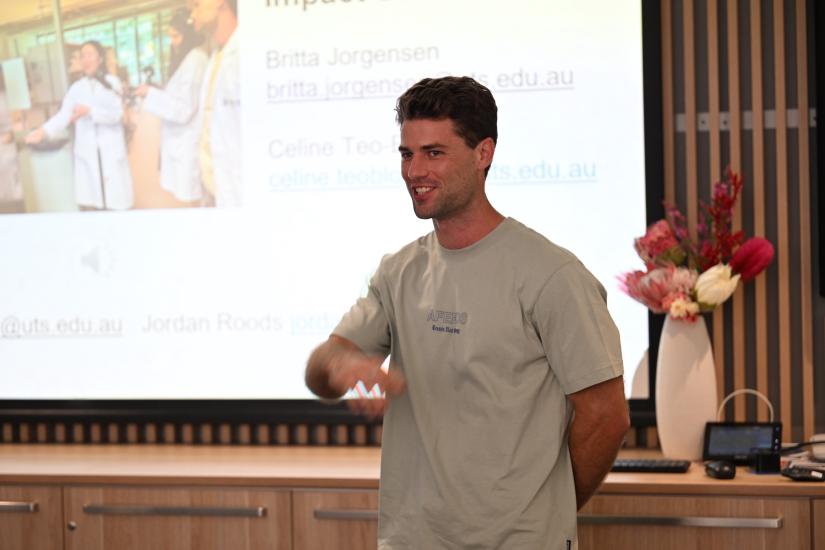
Jordan Roods speaking at Research Cafe
Opening the Cafe, Interim Pro Vice Chancellor of Social Justice and Inclusion Amy Persson set the stage, praising Impact Studios for its exceptional work.
“Impact Studios exemplifies UTS’ commitment to creative modes of research translation,” she said.
“This year, the team released more than 30 episodes of highly creative, innovative and impactful audio produced by a group of 10 crack producers, some of whom have been nominated for prizes including the Australian Podcast Awards and the international Signal Awards.”
Sarah Gilbert, Impact Studios’ executive producer, introduced some of the team’s podcast highlights including Hey History, Australia’s first history podcast for kids.
“Hey History is pegged to the national curriculum and was made for use in classrooms, but the programs can also be for use in long car trips,” she explained, encouraging people to listen to the series this summer and introduce the whole family to Australian history.
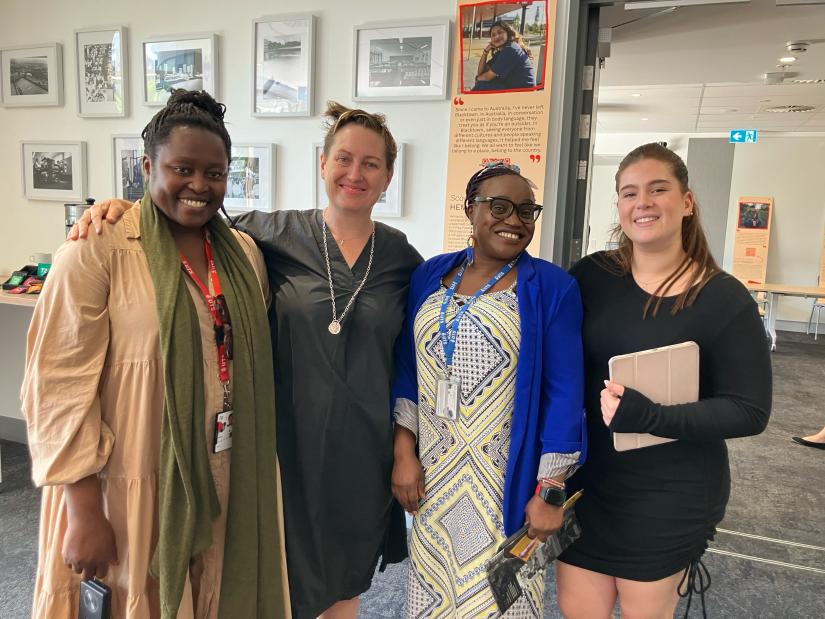
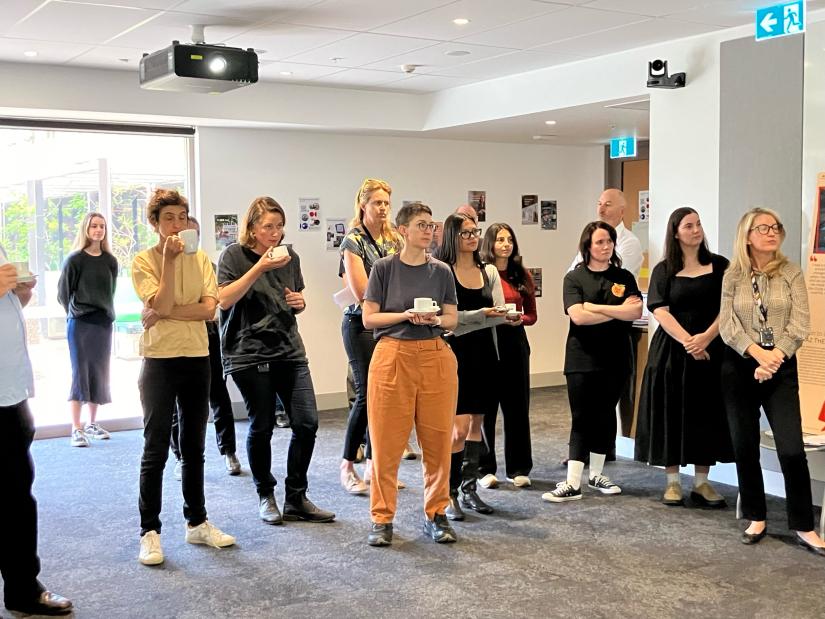
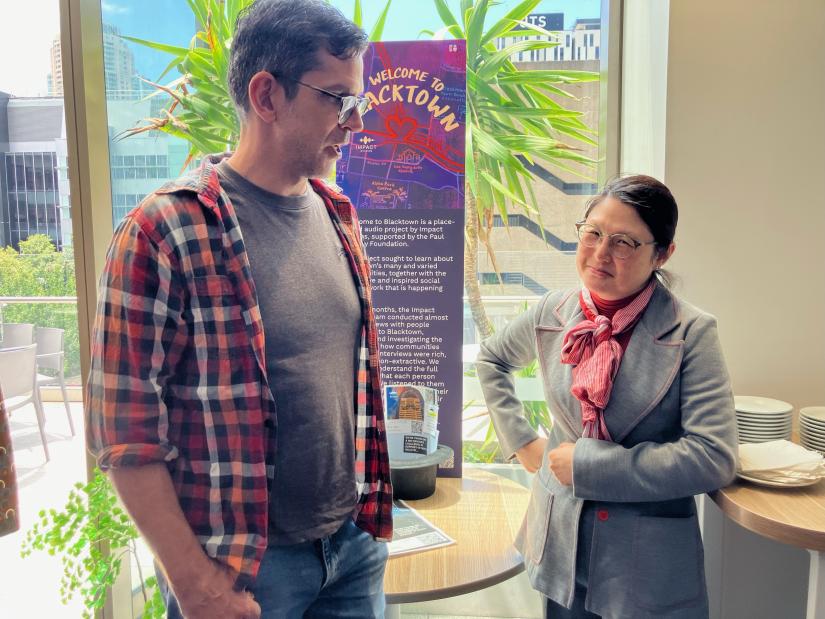
Looking ahead, Sarah hinted at exciting projects: a podcast to amplify Aboriginal women's voices in discussions about domestic violence, collaborations with the UTS Law School, and a podcast on the Darlinghurst HIV epidemic as part of the History Lab series.
Upcoming projects include those made in collaboration with Western Sydney University, a forthcoming History Lab season on Caribbean Australians and a new literary podcast co-produced with the Sydney Review of Books.
The team has also launched Impact Talks at UTS, a podcast that shares UTS live talks on all the usual apps so that people can listen to them after the event from anywhere.
Reaching new audiences for research
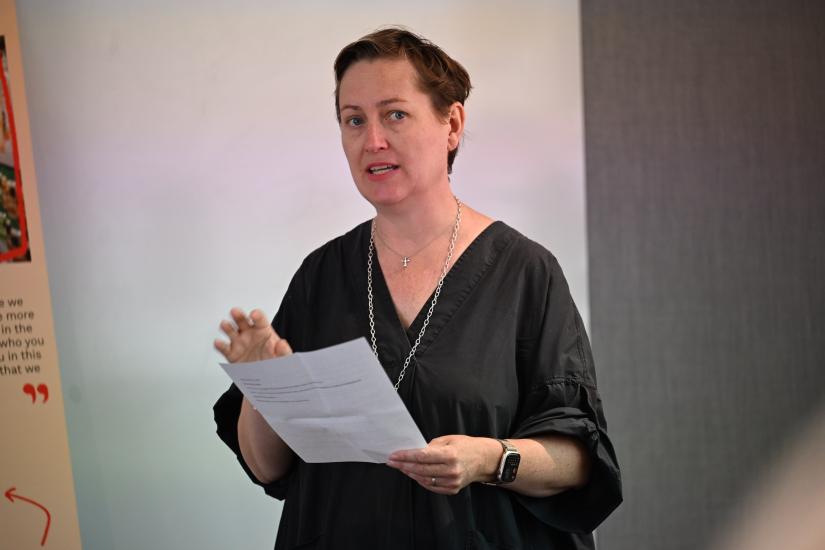
Sarah said that podcasts occupy a growing presence in the Australian media landscape and are a powerful platform for research translation and impact, especially given how many Australians are regular podcast listeners.
“There's about 8.2 million people who listen to podcasts regularly, with 2 million tuning in daily,” she said. “Podcasts attract a younger audience, with 60% of listeners engaging with a new podcast every month.”
“There’s an insatiable hunger for new material, and about 93% of podcast listeners could be described as learners - people who are looking to podcasts to give them new knowledge.”
There’s an insatiable hunger for new material, and about 93% of podcast listeners could be described as learners - people who are looking to podcasts to give them new knowledge.
Sarah said that podcasts are a new way to reach people who want to hear your stories, urging everyone to consider pitching to be part of the Impact Studios 2025 production slate.
Learn about the Impact Studios pitching round.
Transforming waste into resources
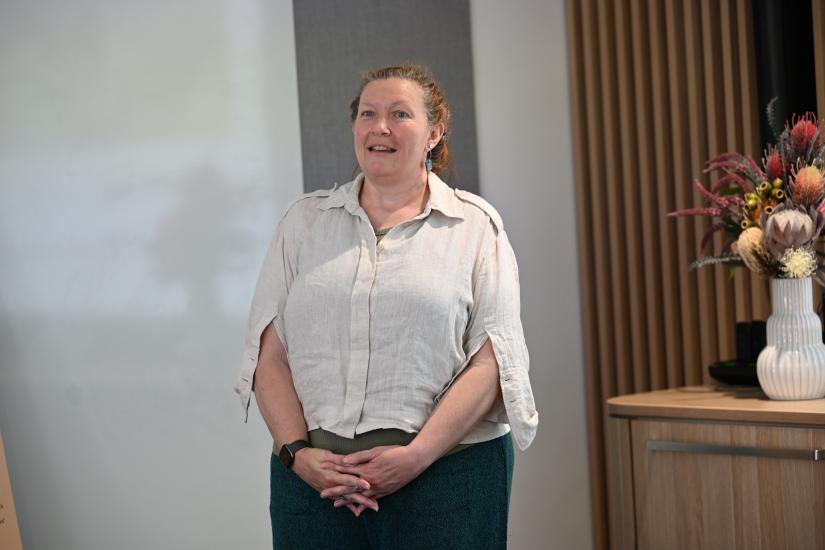
A highlight of the Research Café was hearing from Team Liquid Gold, PhD candidates Jordan Roods and Kerry Tozer from the UTS Institute for Sustainable Futures.
Their research project is part of the ARC Nutrients in the Circular Economy (NICE) Hub that explores turning human urine into renewable fertilisers.
A research collaboration between universities, government departments, industry and civil society organisations, NICE research looks at how to turn something all of us create every day into something that can help grow our food and become part of a circular nutrient economy.
I could see that a podcast series would enable us to create an artifact for us to use in our research, particularly if we wanted to present it in forums or to potential collaborators.
“We have technological solutions, but how do we scale this system when it involves so many stakeholders, from wastewater providers to farmers?” asked Jordan, who is examining the governance of such systems.
Kerry’s research is around the market and the business structures, and how to support a circular nutrient economy through the supply chain and the value chain.
“I am interested in what needs to change in our frameworks and in our business structures to actually support that and make it happen,” she said.
Kerry responded to the Impact Studios online pitch call out last year. She thought it would be a really great way to promote the team’s research and generate some publicity and awareness around the NICE Hub.
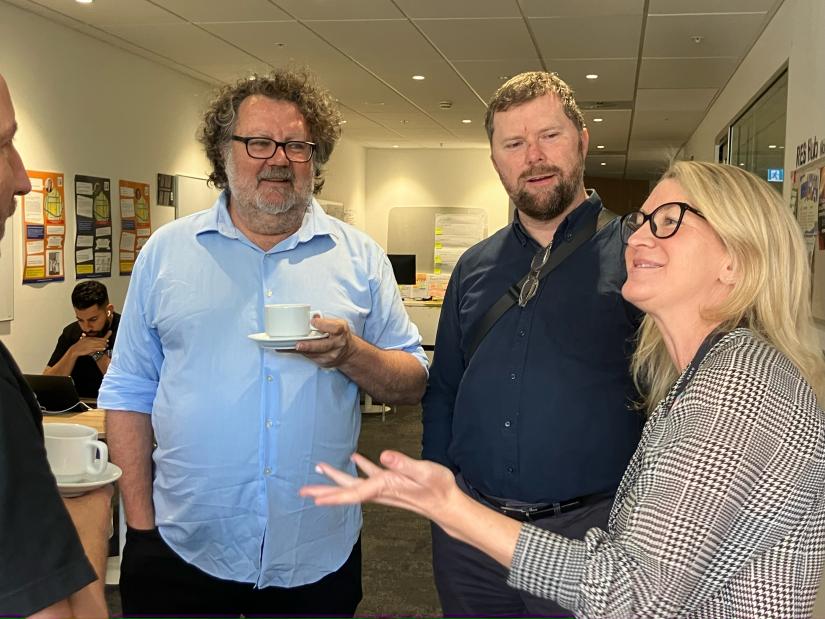
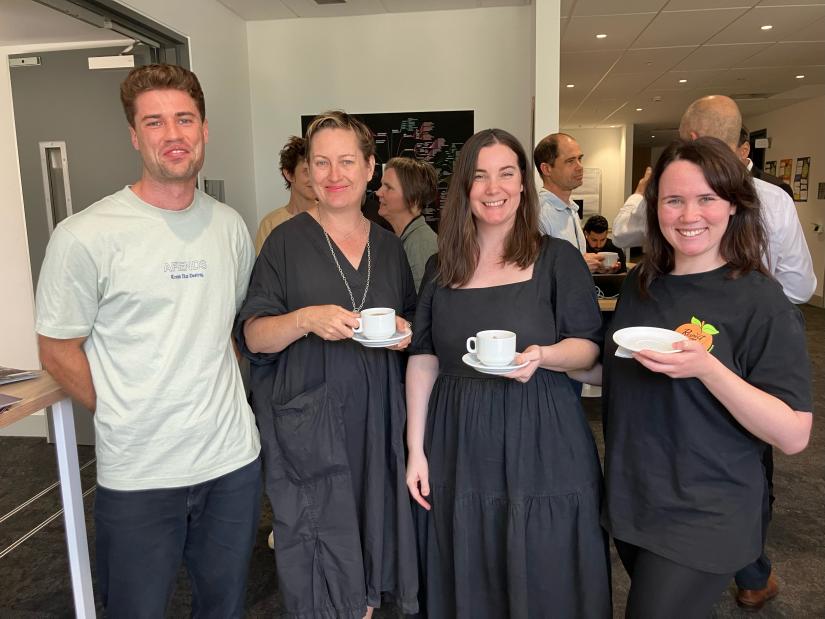
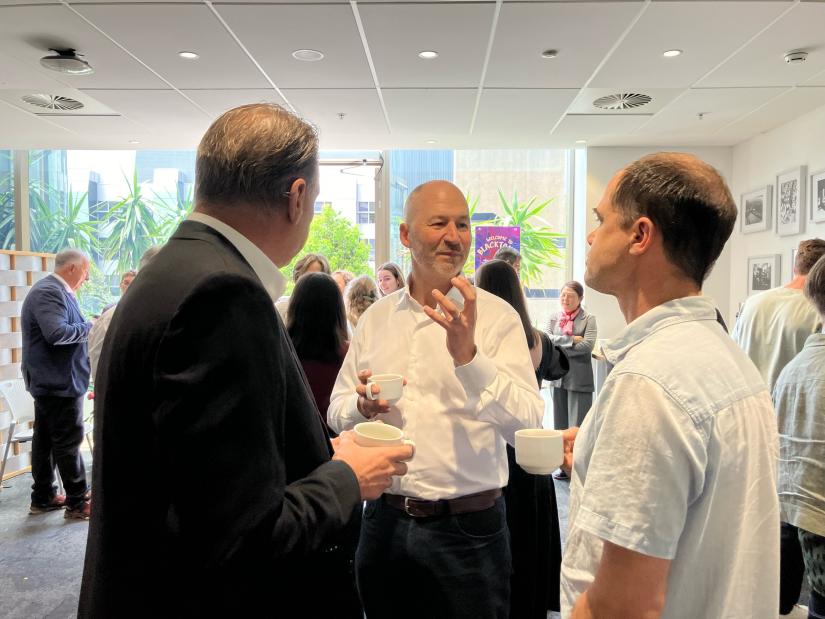
“I could see that a podcast series would enable us to create an artifact for us to use in our research, particularly if we wanted to present it in forums or to potential collaborators,” she said.
For both researchers, making a podcast series has been a valuable experience. The process has taught them about interviewing skills and how to frame their research in a narrative that would resonate with different audiences.
“I really like the idea of being able to give people a link and say, ‘Hey, if you're really interested in what we're doing, here's this awesome podcast that we've put together to help you really understand what it is we are trying to do and what our research is about, and why it's so important’,” Kerry explained.
Bringing Australian history to life
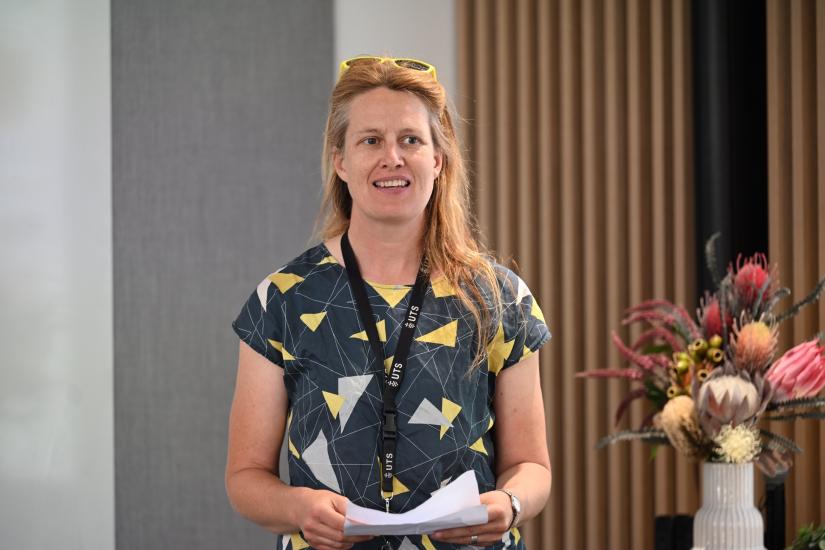
Historian Professor Anna Clark spoke about Hey History, a curriculum-aligned resource for teachers designed to tackle complex topics in Australian history.
“Many teachers feel underprepared to teach Australian history. Hey History combines immersive storytelling with historians offering expert insights to support teachers in making history come alive for students,” she said.
With episodes featuring voices ranging from archaeologists to Indigenous knowledge holders, the podcast connects kids and educators alike to Australia's rich heritage.
“Our goal was that a teacher could, at the beginning of a class on a particular topic, walk into the classroom and press play, to not only hook kids in, but also be able to use a resource that is mapped to the curriculum,” Anna said.
Hey History combines immersive storytelling with historians offering expert insights to support teachers in making history come alive for students.
Considering that student teachers may only have a couple of weeks of Australian history study during their degree and are then expected to teach it as part of the Australian curriculum, Anna said that it is no surprise that many teachers feel underprepared to teach Australian history.
“They are particularly unconfident about teaching the complexity around issues of Indigenous history, teaching on Country, teaching about colonisation and so on,” Anna said.
“This podcast resource allows them to begin conversations with their students and feel more confident about teaching Australian History.”
Ready to share your research?
Got a powerful research story to share? Impact Studios is now calling for podcast pitches from UTS academics to enter their 2025 Pitching Competition. They’re looking for original and creative ideas with research impact!
Download this guide to making audio for researchers to learn more about how Impact works and complete the pitch form EOI before 15 December!